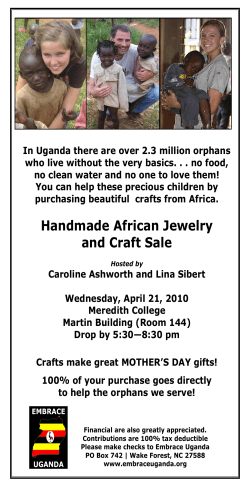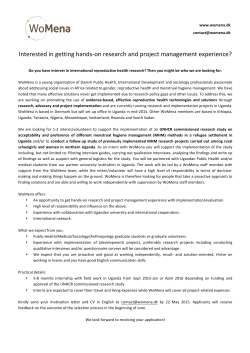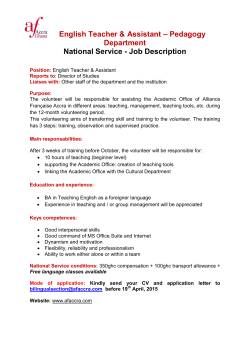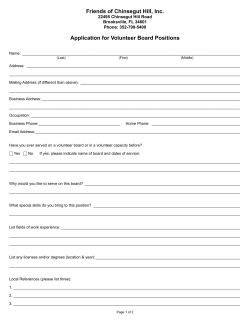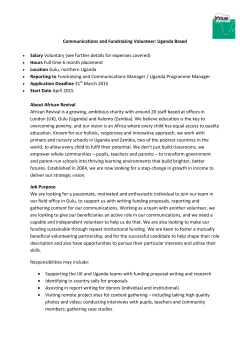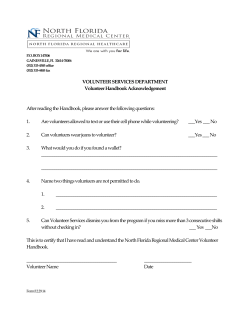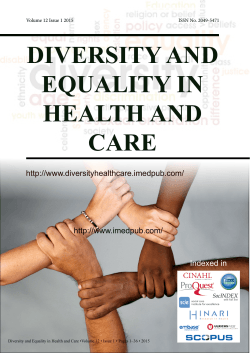
The Kellermann Foundation Newsletter
The Kellermann Foundation Newsletter Sharing the impact of your generosity on southwestern Uganda Rabbit and pig programs breed opportunity A new rabbit and pig husbandry program is bringing new sources of income, nutrition, and economic empowerment to the lives of families in two Batwa pygmy settlements. Nineteen Batwa families were each loaned a starter rabbit pair for sustained rabbit rearing starting in 2013. A follow-up training visit in February revealed to organizers with the Christian Veterinary Mission (CVM) that the comprehensive pilot program they began is still thriving and expanding. The recipients had good results. Ester reported four litters produced. Justus reported over 40 offspring produced from his original pair. Pascal used the rabbit income to build a pit latrine in his family’s compound. from the BDP were trained to track the animals and offer basic veterinary care to sustain the program. “It is encouraging to see the level of motivation, engagement, and achievement seen with the rabbit revolving loan program, especially given the history of the Batwa,” said Dr. Daniel Graham, the veterinarian who taught the program with his wife, Rachel, and their colleagues with the CVM. The Batwa pygmies are traditionally a forest-dwelling group with no animal husbandry in their culture. The Batwa were displaced from the Bwindi Impenetrable Forest in 1992 when it was declared a World Heritage Site to protect endangered gorillas. The BDP, with support from the Kellermann Foundation, is dedicated to “helping the Batwa help themselves” as they rebuild their livelihood in a new environment. The rabbits are now being sold for income, consumed at home, and given to family members, which The Batwa families who Batwa pygmies learn rabbit feed concepts with pictures expands the program to received these animals atand a game taught by Dr. Graham. even more households. tended two lively days of Original rabbit pairs have interactive training presented by CVM in unique ways all been repaid to the Batwa Development Program to cater to the local culture. (BDP) for redistribution. Understanding the Batwa’s low literacy levels and a Before this program, families reported that they ate tradition of passing history and teaching verbally, meat an average of only once per month. Rabbits Graham and his staff presented a pictorial training were chosen because they are similar to traditional guide and facilitated hands-on discovery sessions. bush meats, and their reproduction time reveals The programs included Biblical teachings on stewardquick benefits to encourage the farmers. ship to foster a spirit of fiscal responsibility. Participants built their own raised shelter for their animals The success of the program prompted the organizers based on the guide. to start a pig husbandry project last year in two Batwa communities with funds from the CVM Animal Impact “If they produce and grow, then I’ll be able to taste Fund. The recipients received the pig pairs and an asrabbit meat,” said Jacklyn, a 2014 rabbit pair recipisortment of forage seedlings and seeds for feed. Staff ent. “After the rabbits multiply, I‘ll sell some of them. I would like to buy seats for inside my house.” Volume 6 Number 2 April 2015 Issued quarterly by The Kellermann Foundation, a 501(c)(3) nonprofit Access your 2014 annual report here In this issue: Volunteers: Bringing orthopedic specialties 2 Donors: Insurance opens medical access 3 Tidbits: Nursing student thanks; Batwa film wins award 4 Florence’s rabbits have produced seven bunnies. Her plan: “I’ll sell some … until I am able to buy a goat” for a larger project. Training workshop encourages schoolteachers Dry season is a time of vacation for students in Bwindi, but in January, teachers from two schools spent that time sharpening their skills in a week-long workshop sponsored by the Batwa Development Program (BDP) and funded by the Kellermann Foundation. Seven teachers from the schools at the Batwa settlements of Byumba and Mukongoro attended the workshop, which covered current methods and approaches to education, the national aims of education, the professional code of conduct, and daily lesson planning. Training workshops are a fresh feature for these settlement schools, which are not yet eligible for the ongoing professional development offered by Uganda’s Ministry of Education. The schools were started in recent years by the BDP and the Kellermann Foundation to boost Batwa education levels. This training team was made up of teachers from the Community School in neighboring Buhoma, who were recruited and facilitated by BDP Coordinator Rev. Canon Enos Komunda and Amari Taylor, a long-term BDP volunteer from California. (cont. on pg. 2) Page 2 The Kellermann Foundation Newsletter Volunteer Corner: Seth and Megan Frenzen This spring, Seth and Megan (Meg) Frenzen will return for the sixth time in six years to volunteer at Bwindi Community Hospital (BCH). The Burlington, Vermont, residents will bring their six-month-old son, Felix, and Meg’s mother to help care for him. surgery, separating the fingers, and she lay quietly crying when he finished. I asked a nurse to translate for me and inquired if she was in pain. The patient explained that she was crying out of happiness; she had married two years prior and could now wear a wedding band. Seth is an orthopedic surgeon, and Meg works as a consultant in health policy. In a recent interview, we learned more about them. What changes have you seen at BCH? The first year we were at BCH, we used a bicycle tire tube as a tourniquet; there was no general anesthesia and few tools. We didn't know that we would be performing BCH's first ever orthopedic surgeries. In five short years, BCH transformed into a hospital that supported a complex hip replacement surgery! It's amazing! What work do you perform in Bwindi? We run the week-long orthopedic camp. Seth performs 15-20 surgeries and sees 60+ patients in clinic. I (Meg) manage the clinic, schedule operations, and work as a tech if necessary. How did you hear about the Kellermann Foundation and BCH? We had just returned from serving in Cambodia and saw a friend at a Christmas party who is familiar with BCH. The friend asked if we would ever be interested in doing similar work in Uganda… So our work began. We have a fundraiser cocktail party every year to help raise the Seth and Meg with friends at Bwindi. costs of running the camp. We are so grateful to our supporters in Vermont! Why keep coming? BCH is an amazing place. We have continually been impressed with the Ugandan staff at the hospital. They are among the most committed, hard-working, intelligent, resourceful, and compassionate people we have ever met. The patients are so appreciative. It's just an incredibly special place. What can you share with potential donors and volunteers of the Kellermann Foundation? We have traveled a lot. We have volunteered a lot. We have never been to a place as remarkable as BCH. The donated dollars and the donated time truly make a world of difference there. Resources are used so efficiently. Donors and volunteers can be absolutely positive that what they give goes to the right places. What common orthopedic problems do you see in Bwindi? The lack of access to trauma care results in some very complex orthopedic problems. Fractures and dislocations that are months or even years old are not uncommon. It's so heartbreaking. Seth (right) and BCH staff members in surgery. Can you share an impressionable moment? One young woman was born with two fingers attached to each other. Seth performed her Seth consulting x-rays for a patient’s care. Teacher training (cont. from pg. 1) Trainers stressed the importance of teaching the children to love learning as a model for building the nation’s next generation. “Love your work,” the trainers taught. “Aim at serving, not at being served.” the trainers, transport, food, and materials through the support of the Kellermann Foundation. These teachers returned to their classrooms refreshed with training and a new mutual supporting network of teachers from Buhoma, Byumba, and The teaching team modeled what they taught, involvMunkongoro. This renewed commitment and access ing their trainee teachers with questions and activities to mentors in the field is encouraging to the particito reinforce each session. The teachers also learned pants, who are eager to learn new skills. inventive strategies to engage children with instructional tools made from local materials, such as tree branches. The Kellermann Foundation is seeking a longThe teacher trainees were unanimous in appreciating the value of this workshop, and the BDP hopes to sponsor more such training sessions. The BDP funded term volunteer with an education background. For more information, email volunteer@kellermannfoundation.org. Making learning tools from a tree branch. Page 3 April 2015 Donor Corner: Giving for Bwindi I was given a great opportunity to visit central Africa and Uganda this past summer. The beauty of this part of the world is incredible. The beauty of her people is equally incredible. Many of these people groups struggle for the merest subsistence. This is certainly true of the Batwa population. It is also true of the Bwindi region and community as a whole. As a healthcare provider, I was sincerely awed by the amount of service that is provided with relatively minimal funding. The minimal resources of Bwindi Community Hospital go a long way in delivering service. Not only is highquality healthcare provided, but essential education is also provided for the population. Health and education are key for Bwindi to emerge from its poverty. Far-reaching education programs for HIV and malaria prevention, sanitation and clean water sources, and prenatal and family planning are fundamental to aiding in this emergence. My donation to the Kellermann Foundation cause means a lot to me. Although I have donated to a variety of charitable organizations in the past, this particular donation is extra special. I believe this contribution will be far reaching and of great benefit to the people of Bwindi directly now, as well as in the future. All humans are interconnected. In assisting others, we help ourselves. Organizations like the Kellermann Foundation truly help the world community in present and long-lasting ways. Insurance plan changes attitudes Dr. David Davis’ recent gift to the Kellermann Foundation (see article above) is being used to support eQuality Health Bwindi. This local insurance program created by Bwindi Community Hospital (BCH) is unique in its approach to providing high-quality healthcare for a minimal investment. Health insurance is a relatively new concept in Uganda, with only about 5% of Ugandans countrywide enrolled in such plans. Currently, a subscriber to eQuality Health Bwindi pays 10,200 Uganda shillings per year (about $3.50) to enroll. This allows each subscriber to access all basic medical care at the hospital at low costs. For children under five years old, the rates are even lower and cover more services. Dr. Davis visits with new friends at Bwindi. His donation to the Kellermann Foundation has provided affordable healthcare through eQuality insurance. Compiled from contributions by Barbara Thomas Now that eQuality is encouraged in the community, people who subscribe tend to seek care for illness or injury more quickly, and they think first about coming to Bwindi Community Hospital where they have already invested. with further experience and community outreach, subscribers understand that if they didn’t use the medical services, their contributions enabled someone else in the community to receive needed services. As the program began, many expected to receive back what they had paid for insurance if they hadn’t used the medical services. Now, The hospital’s electronic database allows BCH workers to monitor which residents are subscribers. It also includes GPS information that allows the hospital to map diseases and poverty information, thus targeting outreach services to those who most need them. The fees paid by users do not cover the complete cost of care. BCH absorbs the remaining cost as the hospital’s contribution back to the community. The Kellermann Foundation and other stakeholders also help support these costs and other program expenses such as outreach, marketing, IT, and staff expenses. Patients who are not eQuality subscribers pay significantly more, with surgery costing up to $105 and hospital stays $14 a night. Such charges can be prohibitive for those in rural Uganda who typically live on about $1 per day. eQuality Fast Facts Ugandans with health insurance The eQuality Health program has changed peoples’ lives and how they think about health care and its accessibility. Without the insurance, Bwindi residents were previously forced to consider whether they could afford treatment before transporting a sick family member to a major hospital. “Thousands are driven into poverty each year due to catastrophic health expenditures,” explains Dr. Birungi Mutahunga, executive director of BCH. Contributed by David Davis, MD 5% Bwindi residents with eQuality ins. 38% Annual subscription cost $3.50 Subscriber visit cost $0.70 Nonsubscriber visit cost $7.00 Subscriber surgery cost $17.50 - $24.50 Nonsubscriber surgery cost A BCH employee helps a child enroll in eQuality Health using a fingerprint recognition system. Area average annual income $35 - $105 <$350 THANK YOU from Bwindi nursing students Nearly half the students at Uganda Nursing School Bwindi have been the grateful recipients of scholarships from generous donors like you across the U.S. Selected students receive complete support toward their education, including tuition and fees, supplies, food and lodging, transportation, and more, at a cost of only $4,500 per year. P.O. Box 832809 Richardson, TX 75083-2809 Donors like you—individuals, groups, and organizations—can encounter the joy of changing a life in southwest Uganda by giving a full or partial scholarship. We hope you will help! Phone: (972) 685-0279 Email: info@kellermannfoundation.org Website: kellermannfoundation.org Moses says, “Thank you!” To support a UNSB student, click Donate Now or call our office for more information at (972) 685-0279. Staff Executive Director Sally Stillings Executive Assistant Janet Soo Maxwell Victoria Briscoe Thank you for giving these students a chance to help others! Donations Associate Brandi Thomas Communications and Volunteer Coordinator Emily Kuhnel Kellermann Foundation Board Members 2015 Jean Creasey, DDS, President Nevada City, CA Sarah Woerner, MD, Secretary Nevada City, CA Shamirah says, “Thank you!” Tidbits Batwa film wins award In January, we welcomed Emily Kuhnel as our new communications and volunteer coordinator. Emily manages all Dallas-area and international volunteers for our programs. She is also instrumental in implementing our communications plan. You can reach her at volunteer@kellermannfoundation.org. In March, we welcomed Victoria Briscoe as our new executive assistant. Victoria will serve as assistant to our executive director, as well as managing compliance, bookkeeping, and other essential functions. Welcome aboard, Emily and Victoria! Victoria is replacing Janet Soo Maxwell, executive assistant since 2013, who is moving to California this summer with her family. Janet will be missed. Best of luck with your future endeavors, Janet! A German children’s television show featuring the daily life of a young member of the Batwa tribe has won the Best Documentary for Children — Audience Award in the 7th International Short Film Festival for Children and Youth in Berlin. German filmmakers traveled to Bwindi in 2013 to feature a young girl named Mackline in the documentary, The Jungle Kids. The film was broadcast on Germany’s educational TV program Look Into My World, which teaches children about international cultures. Special thanks to producer Frank Fuestle with ff-movie.tv production company for donating the prize of 500 euros to the Kellermann Foundation. The gift will support the education of Batwa children. The 5th annual Batwa Challenge 5K and 10K run and 5K walk will take place in Nevada City, California, on Saturday, August 15. All proceeds will benefit the Kellermann Foundation. To volunteer, register, or learn more, visit www.batwachallenge.com. Lana Valenta, Treasurer Dallas, TX Rev. Clif Gardner, Dallas, TX Gina Lambright, Silver Spring, MD Stacy Lippert, Park City, UT Bob McLendon, Richardson, TX Gayle Porter, Dallas, TX Dan Weston, Dallas, TX Alan Wong, MD, Nevada City, CA Andrew says, “Thank you!” Mackline
© Copyright 2025


